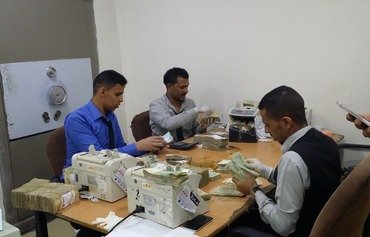Commercial banks and exchange firms in Yemen on Tuesday (August 15th) began to implement the Aden-based Central Bank's decision to float the rate of exchange of the local currency.
The move came amid warnings about the rise in price of imported commodities, as the tough living conditions Yemenis are facing as a result of the war has negatively affected all aspects of life.
The Central Bank on Monday (August 14th) decided to float the riyal. This means its rate against other foreign currencies will be determined by supply and demand, rather than a fixed rate set by the government.
As a result of this move, the fixed rate of exchange of the US dollar against the Yemeni riyal, which had been set at 250 riyals, has increased to 370 riyals, per the actual market prices.
The decision to float the riyal is "positive", National Bank chairman Mohammed Hassan Halbub told Al-Mashareq, as it will put an end to some corrupt practices, curb imports and increase the state’s customs revenues.
"The Central Bank itself and commercial banks did not abide by the official rate of exchange, and the market was using the market price," he said. "The floatation decision, therefore, is not new, and its impact will be limited because we have been living in the same circumstances for about a year."
Some reservations about decision
Meanwhile, Co-operative Agricultural Credit Bank (CACB) vice-chairman Faris al-Jaadabi told Al-Mashareq he believes the decision is correct in theory, but in practice, it should have been taken over stages and in co-ordination with banks.
This would have helped to minimize losses, restore the monetary cycle, activate the state’s monetary policy and return control over monetary supply to the Central Bank, he said.
"Issuing this decision, suddenly and without the above steps, will have major negative implications, the most important of which is the unplanned rise of the rate of exchange and the loss of value of the local currency," he said.
The latter is due to speculation on the US dollar "as a result of fear and greed", he explained, adding that the exchange rate for the dollar "is expected to hit the 400 riyal mark shortly".
Another negative implication is the enhancement of the capabilities of the black market, which is 70% controlled by the Houthis (Ansarallah), al-Jaadabi said.
Meanwhile, at least for now, he added, "the Central Bank has no power to intervene in the monetary supply or direct or influence the market price".
"The consequences resulting from the implementation of this decision include destabilising the banking market, and making it further lose confidence in favour of the black market," he said.
Yemeni banks face steep losses
"There are banks which have a hard currency shortage of up to $300 million, foremost among which is CACB, Yemen’s third government and commercial bank in terms of size of deposits", al-Jaadabi said.
"CACB may lose up to 30 billion riyals ($120 million) as a result of this decision," he said, noting that the bank has 3,000 employees and 400,000 clients, and that it controls about 30% of the Yemeni market.
"Its losses will exceed its capital," he added.
Floating the exchange rate will make international organisations classify Yemen as "a non-banking state, like Iran and North Korea", in case a Yemeni bank collapses, al-Jaadabi said.
These organisations are currently considering this option, and also considered it before the floatation decision, because the Central Bank did not abide by their instructions, he said.
"In addition, the risks of the local currency collapsing against the US dollar will increase, because the Central Bank is now backing up the new monetary policy [by printing money] to meet the government’s monetary shortage," he noted.
Floatation 'may be a catastrophe'
The decision also will serve the Houthis, al-Jaadabi said.
This will support the argument of Houthi-backed local banks that the legitimate government is failing to manage the country's financial and economic file, and will lend greater credence to the Houthis efforts to assume the role of the national authority and give them greater legitimacy in the eyes of other nations, he said.
Yemen Studies and Economic Media Centre director Mustafa Nasr warned against the Central Bank’s decision.
"The floatation of the riyal's rate of exchange against the US dollar and other foreign currencies may be a catastrophe for the legitimate government’s Central Bank" if the Houthis and their allies do not recognise it, he told Al-Mashareq.
"The Aden-based Central Bank’s lack of effective management of the monetary policy may compound the citizens’ living conditions," he said.
"The floatation decision requires effective management of the monetary policy that would alleviate its negative impact," he explained, noting that this is "something that the current Central Bank’s administration lacks".
On a positive note, he said, the new currency rate will lead to a sharp increase in customs revenue and will be beneficial to the state.
"However, this will be negative for citizens, because it will be negatively reflected in the prices of imported commodities," he said.

![A Yemeni man counts stacks of Yemeni riyals on a street in Sanaa on February 12th. A recent Central Bank decision to float the rate of exchange has met with mixed reactions from bankers. [Mohammed Huwais/AFP]](/cnmi_am/images/2017/08/16/9233-Yemen-sanaa-currency-600_384.jpg)







I think there is political bias in this article, as the decision is right under the financial circumstances. Whoever says that the decision was not right must tell us what should have been done in view of the exploitation, by bankers and black market, of the increasing value of US dollar and decreased value of Riyal.
Reply1 Comment(s)